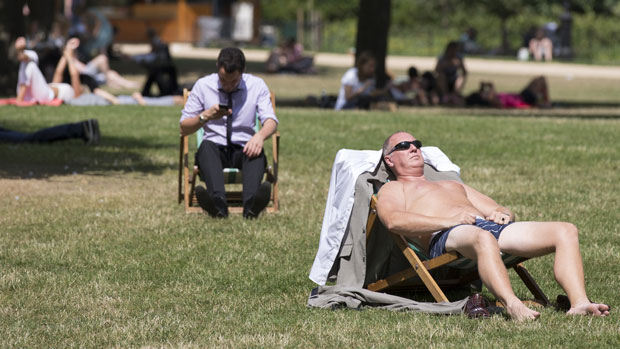UK gears for hottest day as study says ‘no doubt left’ on global warming
Major historical data shows current warming is unprecedented in past 2,000 years

A free daily email with the biggest news stories of the day – and the best features from TheWeek.com
You are now subscribed
Your newsletter sign-up was successful
The scientific consensus that humans are causing global warming is likely to have passed 99%, according to unprecedented research.
“Three studies published in Nature and Nature Geoscience use extensive historical data to show there has never been a period in the last 2,000 years when temperature changes have been as fast and extensive as in recent decades,” reports The Guardian.
It comes as Britain braces for the hottest day on record. The Met Office has said there is a 70% chance of temperatures beating the current record of 38.5C from August 2003. Heights of 39C are forecast in southern and eastern England later today.
The Week
Escape your echo chamber. Get the facts behind the news, plus analysis from multiple perspectives.

Sign up for The Week's Free Newsletters
From our morning news briefing to a weekly Good News Newsletter, get the best of The Week delivered directly to your inbox.
From our morning news briefing to a weekly Good News Newsletter, get the best of The Week delivered directly to your inbox.
The Guardian notes that Belgium, Germany and the Netherlands have all recorded their highest ever temperatures “as the second extreme heatwave in as many months to be linked by scientists to the climate emergency grips the continent”.
Clare Nullis, a World Meteorological Organization spokeswoman, told The Guardian that the current heatwaves bore the “hallmark of climate change”. The extreme events were “becoming more frequent, they’re starting earlier, and they’re becoming more intense”, she said. “It’s not a problem that’s going to go away.”
Meanwhile, the experts in Nature and Nature Geoscience say that historic events – such as the Roman Warm Period, which ran from AD 250 to AD 400, and the Little Ice Age, which saw temperatures drop for centuries from the 1300s - cannot compare with the scale of warming seen over the last century.
“That's significant,” says ABC News, “because climate change deniers have sometimes pointed to [those events] to argue that the current global warming is one among multiple similar global climate events.”
A free daily email with the biggest news stories of the day – and the best features from TheWeek.com
The new research concluded that the current warming rate is higher than any observed previously and that the new findings destroy the claims of climate sceptics.
“We find that the warmest period of the past two millennia occurred during the 20th Century for more than 98% of the globe,” one of their reports states. “This provides strong evidence that anthropogenic (human induced) global warming is not only unparalleled in terms of absolute temperatures but also unprecedented in spatial consistency within the context of the past 2,000 years.”
Professor Mark Maslin, from University College London, who wasn't part of the studies, says “This paper should finally stop climate change deniers claiming that the recent observed coherent global warming is part of a natural climate cycle.”
Network Rail warned of disruption in areas where tracks were at risk of buckling - with many rail firms warning passengers not to travel. Public Health England has maintained a level three heat health watch for eastern areas of England.
-
 Political cartoons for February 11
Political cartoons for February 11Cartoons Wednesday's political cartoons include erasing Epstein, the national debt, and disease on demand
-
 The Week contest: Lubricant larceny
The Week contest: Lubricant larcenyPuzzles and Quizzes
-
 Can the UK take any more rain?
Can the UK take any more rain?Today’s Big Question An Atlantic jet stream is ‘stuck’ over British skies, leading to ‘biblical’ downpours and more than 40 consecutive days of rain in some areas
-
 Can the UK take any more rain?
Can the UK take any more rain?Today’s Big Question An Atlantic jet stream is ‘stuck’ over British skies, leading to ‘biblical’ downpours and more than 40 consecutive days of rain in some areas
-
 As temperatures rise, US incomes fall
As temperatures rise, US incomes fallUnder the radar Elevated temperatures are capable of affecting the entire economy
-
 The world is entering an ‘era of water bankruptcy’
The world is entering an ‘era of water bankruptcy’The explainer Water might soon be more valuable than gold
-
 Climate change could lead to a reptile ‘sexpocalypse’
Climate change could lead to a reptile ‘sexpocalypse’Under the radar The gender gap has hit the animal kingdom
-
 The former largest iceberg is turning blue. It’s a bad sign.
The former largest iceberg is turning blue. It’s a bad sign.Under the radar It is quickly melting away
-
 How drones detected a deadly threat to Arctic whales
How drones detected a deadly threat to Arctic whalesUnder the radar Monitoring the sea in the air
-
 ‘Jumping genes’: how polar bears are rewiring their DNA to survive the warming Arctic
‘Jumping genes’: how polar bears are rewiring their DNA to survive the warming ArcticUnder the radar The species is adapting to warmer temperatures
-
 Environment breakthroughs of 2025
Environment breakthroughs of 2025In Depth Progress was made this year on carbon dioxide tracking, food waste upcycling, sodium batteries, microplastic monitoring and green concrete